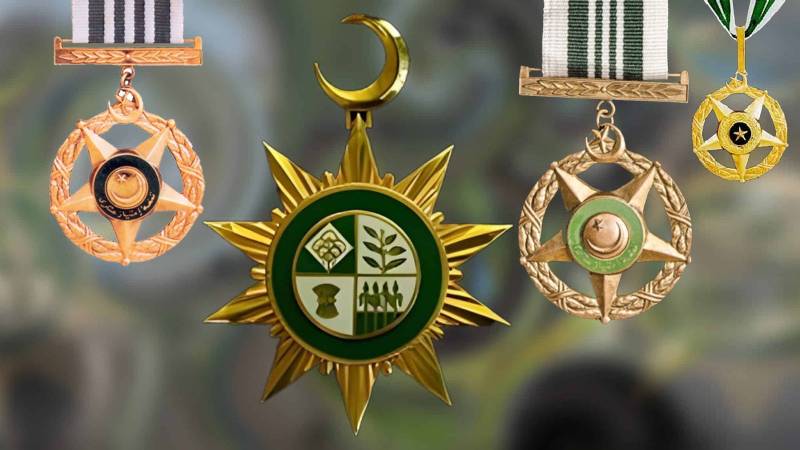
On August 14—as is tradition—the government published this year’s list of civil awards recipients. The list includes almost 400 names—a few recognizable and many not so much. Those familiar with the process of granting the awards acknowledge that this annual list includes only a handful of individuals worth their salt—the rest are what we colloquially call laloo panjoos (riff raff) and sifarshees (grifters), often recommended by sycophants and minions.
Many of the laloo panjoos are a joke. Others point to a deep crookedness embedded in our collective spirit. As an example, consider “X” on this year’s list, a recipient of the Tamgha-e-Imtiaz for services to the country. X headed a well-known institution for over a decade before the institution discovered that they engaged in a series of glaring unethical activities, including manipulating their child’s grades. The institution then unceremoniously dismissed X.
A letter by the institution’s alumni written in response to the event stated “we feel that … [X’s] … unfortunate pursuit of unethical activities renders … [them] ineligible for any degree of involvement in a public activity related to Pakistan and its betterment. This includes but is not limited to teaching, mentoring and management.”
But that’s not all folks. Many who knew and worked with X have recently discovered that they don’t have a PhD even though they pretended they had one. In fact, X’s civil award citation lists them as a “Dr.” Clearly, the award granters let this through without due diligence.
Institutions across the globe consider falsifying academic credentials a serious offense. Back in 2007, MIT fired its dean of admissions when it discovered she had misled the university about her degrees. In Pakistan, the state seems to reward academic transgressors.
This is just one notorious example out of many. A former HEC chairman—who single-handedly destroyed the higher education landscape in the country—struts around with several civil awards pinned to his lapel. In keeping with how our state mocks our sensibilities, the same gentleman may go on to receive yet another civil award—this time for being the Pakistani with the most civil awards.
By now, placing HEC chairmen/directors and university vice chancellors on these lists has become routine—it’s as if a civil award comes as an official perk with these roles. Why do they deserve these honors? What have they done that sets them apart from others? How has their work made a difference to our lives? Nobody—including the award granters—can really tell.
Thankfully, we have among us individuals who deserve the highest honors yet have the sagacity to question how the state awards contributions. Pervez Hoodbhoy, for example, refused to accept his civil award when the Musharraf regime granted him one. Partly what motivated him was that he didn’t want to receive a civil award under a military dictatorship—he saw the irony where countless other awardees didn’t. But he rejected it also because he wanted to know why exactly was he getting an award—and the granters couldn’t articulate this.
Granting civil awards to minions, crooks and fraudsters has eroded the prestige and value of these awards. This is a shame because it dishonors, undermines, and sullies the work of the individuals who truly deserve their accolades. This year’s list also includes the great poets Iftikhar Arif and Anwar Masood, hockey legend Islahuddin Siddique, and philanthropist Syed Babar Ali. It’s a travesty that Syed Babar Ali—the person who gave this country one of its best universities—shares his name on a list with an academic fraud.
To reestablish civil awards’ prestige, the government must revisit the process of granting them. First, it must stop doling awards like candy. India, with a population over five times ours, granted four times fewer awards—106 vs 397. India just put a rover on the moon—surely, they can’t have fewer talented individuals than us. Reigning back the number of awards that we grant each year would make them more coveted.
Second, the procedure for evaluating nominations should not rest with bureaucrats. Given their training, bureaucrats are not best placed to evaluate nominees from a wide range of fields and disciplines. Leaving selection to bureaucrats also explains why many civil servants—especially those associated with public universities and the HEC—end up with awards each year. Drawing evaluators from a larger pool of civil society members, field experts, and community representatives would lend the process credibility and ensure a fairer selection.
Third, the award granters should precisely articulate their reasons for bestowing each award. The Nobel Prize committee, for example, publishes a summary of the specific contributions of each recipient. Abdus Salam received his Nobel Prize for his “contributions to the theory of the unified weak and electromagnetic interaction between elementary particles, including, inter alia, the prediction of the weak neutral current.” Describing how exactly the recipients have contributed to the state, science, society, or culture would make the awards transparent and help raise their legitimacy among citizens.
Pakistan has a long list of heroes and heroines, who often never appear on any list but have sacrificed their existence in endeavoring to make a difference in our lives. We don’t need the pomp, confetti, and glitz to recognize how they’ve made living easier—even if ever so slightly—in a polity hell-bent on stifling life. These unsung heroes and heroines are also the exemplars that we must honor, celebrate, and cherish—not the Dr. Fraudiyas of the world, whose sordid legacies no amount of Sitara-e-This and Tamagha-e-that will ever restore.

